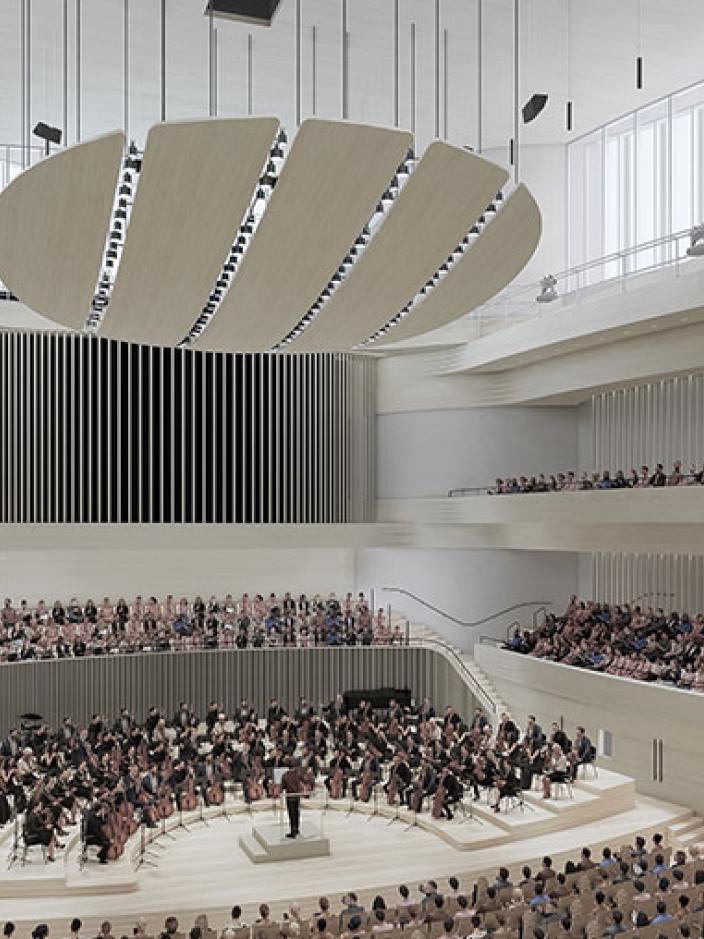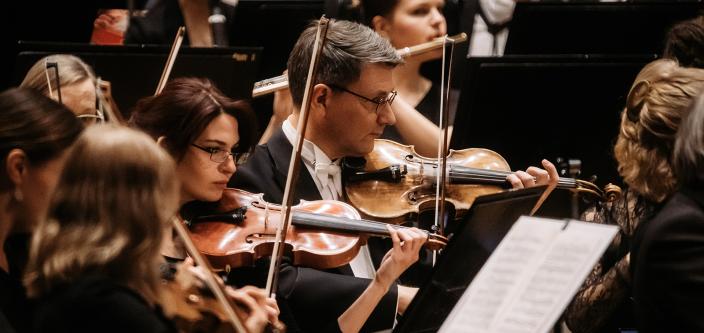For Petri Tulonen, a professional musician and a friend of culture who calls himself a Turku patriot, the new Music Hall is an important project. Fuuga will help the Turku Philharmonic Orchestra to develop and grow. Furthermore, the Music Hall will give a major boost for cultural
As in the song played when the local hockey team TPS scores a goal, the violin is also important for Petri Tulonen, as is his hometown Turku. Tulonen started playing violin at the age of eight in the music class at Puolala school and continued his studies at the Turku Conservatory, graduating as a violin teacher. In 1995, Tulonen was appointed to a permanent position in the second violin section of the Turku Philharmonic Orchestra, where he continues to play.
As a long-term musician, Tulonen is familiar with the current concert hall not only as a workplace but also from his childhood performances. This means that he he knows the building, its limitations and challenges.
– It’s a great building, but unfortunately it has been overtaken by time. It no longer serves its purpose adequately for the musicians or audience, Tulonen says.
The greatest challenges in the current concert hall are its acoustics and its small size. The building and its halls were designed at a time when an orchestra had 27 members. Today, there are 74 musicians in the orchestra, and the long-term goal is to grow into a full-scale symphony orchestra with around 100 members. It is impossible to achieve this objective in the current hall.
– There is already too much noise on stage, which is why we need to wear hearing protection when we play. Naturally, this is not the ideal solution in terms of the musical outcome, as it makes it more difficult to perceive the different nuances of the music.
According to Tulonen, the current hall does not enable sufficient contact within the orchestra and between the orchestra and conductor. Additionally, musicians should be able to adjust their playing to match the other orchestra members without having to guess. The conductor should also hear the orchestra in the same way as the audience. Now these requirements are not met.
Good working conditions create new opportunities
What then is a good concert hall from the perspective of the orchestra and musicians? According to Tulonen, it is a hall that helps the orchestra succeed and develop. The working conditions must be in order both on stage and behind the scenes.
– In Fuuga, the right conditions on the stage of the main hall will enable the development of collaboration within the orchestra. The way we can position ourselves, hear and see each other and be in contact with each other affects our playing. When all this is in balance, it’s easy to play together, says Tulonen.
Another improvement to the current situation is that there will be a great many more rehearsal facilities at Fuuga.
– The completion of Fuuga will make musicians’ everyday life easier with a wider selection of higher-quality individual and group rehearsal facilities. The acoustics of the rehearsal facilities at Fuuga will also be designed to support practice and protect musicians’ hearing.
Good conditions help the orchestra to provide the audience with the best possible experiences. According to Tulonen, this is the main priority.
– The most important thing is that the product is right and the audience enjoys the experience. We are getting a state-of-the-art building with world-class acoustics and top quality in all other areas, too. I'm sure that also the future visitors of Fuuga will be able to sense this.
The fact that we, the musicians, were heard is a sign of the high level of ambition among the designers.
The orchestra was also given a voice at the design table
Tulonen says that the opinions and views of the musicians of the Turku Philharmonic Orchestra have been heard at different stages of designing Fuuga.
– We have been presented with the most recent plans at workshops, and we’ve been able to comment on them. It’s been great to see that our comments have actually been taken into account in the design. The fact that we, the musicians, were heard is a sign of the high level of ambition among the designers and their serious approach to their work.
The project certainly requires a high level of ambition from the designers. Tulonen emphasises that this is a unique project in every way.
– Not everyone may yet fully understand what a remarkable and unique project Fuuga is. The design process cannot always draw from previous experience, as not all concert halls are the same. However, I have great confidence in the design team.
Major significance for cultural life in Turku
Tulonen believes that Fuuga will have far-reaching impacts on both the Philharmonic Orchestra and the cultural life of Turku in a wider sense.
– The orchestra’s recruitment opportunities will improve when we have a state-of-the-art concert hall to offer musicians. Good conditions will certainly attract conductors, soloists and other visitors. A better programme offering, in turn, will generate more interest. I believe Fuuga will generate a positive cycle.
Acoustic music has been the top priority in the design of Fuuga, but the building also provides an outstanding setting for other types of music and a wide range of events. In addition, even though Fuuga is not an opera house, the main hall with its orchestra pit will also enable dramatic performances in acoustic conditions.
– Fuuga’s high quality and versatile offering will certainly inspire people to attend cultural activities more often. The gap that the Covid-19 pandemic left in visitor numbers to the Philharmonic Orchestra concerts has already started to rise to pre-pandemic levels, and the new music hall will definitely fill up the concert hall again, says Tulonen.

